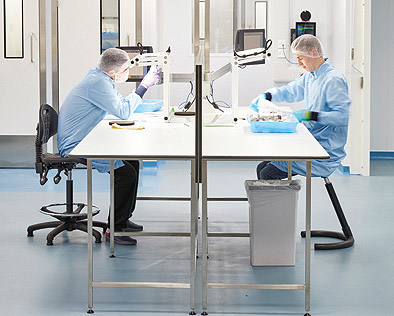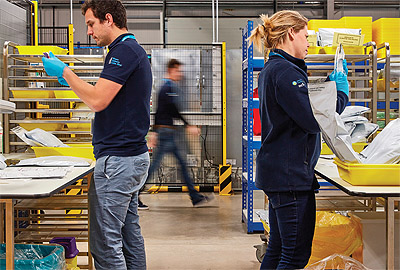Empowering Healthcare: Bath ASU’s Cutting-Edge Solutions
Changing lives for the better
With a dedicated research and development team and a purpose-built manufacturing facility at its disposal, Bath ASU is constantly introducing new, innovative products and methods that are improving outcomes for countless patients across the UK
When Bath Aseptic Services Unit (Bath ASU) was founded at the University of Bath in June 2000, it began life as an education, training and R&D resource for both undergraduates and  postgraduates, whilst also operating as a small commercial aseptic manufacturing facility providing contract assembly and manufacturing for Mayne Pharma and Central Homecare. It was then, in 2006, that Bath ASU became a commercial operation via a management buy-out/buy-in from the University of Bath, with its first NHS contract won later that year to supply dose banded Doxorubicin Syringes to NHS Scotland.
postgraduates, whilst also operating as a small commercial aseptic manufacturing facility providing contract assembly and manufacturing for Mayne Pharma and Central Homecare. It was then, in 2006, that Bath ASU became a commercial operation via a management buy-out/buy-in from the University of Bath, with its first NHS contract won later that year to supply dose banded Doxorubicin Syringes to NHS Scotland.
It was that same year that the first products left the company’s then-new manufacturing facility in Corsham, Wiltshire. A little over a decade later, Bath ASU’s team of specialists produces daily over 2700 individually prepared, injectable medicines that serve more than 220 NHS trusts, homecare providers and private hospitals across the UK, with products also exported to Ireland and France, the later in the form of clinical trial products. These medicines go on to be used to treat patients across the UK who are fighting cancer, living with chronic disease, or are in need of relief from pain or infection.
“Today, we employ nearly 200 people across a range of disciplines, including pharmacists, chemists, microbiologists, pharmacologists, and manufacturing and laboratory technicians,” begins Bath ASU Chief Executive Officer, Chris Watt. “Together, this team assists us in providing a complete range of aseptic manufacturing services, such as patient specific chemotherapy, central intravenous additive services and patient-controlled analgesia products.”
The Bath ASU team operate across 750 square metres of cleanrooms, inside which the company implements a range of safety critical systems that are intended to assure it achieves 100 per cent Right First Time (RFT). Similar standards for safety critical environments can be found within the aeronautical and nuclear industries. Furthermore, Bath ASU’s operations are regulated by MHRA holding Manufacturer Specials and Investigational Medicinal Products licenses.
“One of our historic strengths has been the flexibility and responsiveness associated with a successful owner-managed SME,” Chris states. “We now find ourselves maturing into a larger size business, and operating in a sector with ever increasing regulatory demands and with increasing complexity that comes with size. As a result, we are in the process of structuring ourselves so that, when we act in our different roles as shareholder, executive and manager, we act effectively. As shareholders, we should ensure capital is allocated effectively and returns on investments are achieved. Our expanded board ensures that the Executive develops effective strategies for growth and it is held to account, and where we remain as managers we must ensure we discharge those duties effectively and the same standards we expect of others.”
The quality and range of its products, in particular its responsiveness to new products coming to market, is something that Bath ASU has also developed an enviable reputation for. It is equally respected for its commitment towards the continual development of its customer facing and internal workflow systems in order to improve productivity and service responsiveness, as well as the way it focuses on placing the patient first, and the flexibility and innovation it applies to its price/product strategies.
The latter point is important, as it makes up one part of the criteria that the company looks for its supply chain partners to meet when looking to form strategic future relationships, the others being having a competitive market price and a desire to forge long-term partnerships. “We have a number of strategic supply chain partners, many of whom supply us with licensed pharmaceutical products that we then convert into specials as well as a number of generic suppliers that we work closely with,” Managing Director Richard Wastnage explains: “One of things we do is operate very successful market introduction programmes with such companies to help them introduce their products to market.
“One example of this would be our relationship with Napp Pharmaceuticals. We worked closely with them during the launch of their biosimilar drugs and market share has markedly improved as a result of our collaboration. Together we worked to develop extended shelf lives, stability data for hospitals to utilise, ensure that these same hospitals could go straight to outsourcing and administering a specials drug, and to ensure that Napp Pharmaceuticals had access to a home care channel through Pharmaxo, our own homecare company.”
A further category of supplier that the company works with are those that supply it with consumables that is uses in the manufacturing process. “An example of such a supplier is Nitritex, a high-quality manufacturer of cleanroom consumables, and medical and safety products,” Richard continues. “We have a very good working relationship with Nitritex, to the extent that we have developed products with them that they have then been able to market more widely throughout the UK.”
This past summer saw Bath ASU commence with manufacturing from its third facility, having previously completed the build and commissioning process at the end of 2016. The year to date in 2017 has seen the company incorporating the most advanced use of vaporised hydrogen peroxide decontamination technology in the industry into the facility which, once fully validated, will allow it to scale up its batch sizes to deliver in excess of 120,000 items per month, essentially doubling Bath ASU’s capacity.
In addition to completing the above-mentioned undertaking, Bath ASU’s focus leading into 2018 also includes further extending its product portfolio, exploiting said new technology, expanding its strategic and operational management capabilities, and lastly increasing its human capacity.
“As you can imagine, this is a very specialised field, which is why all training is carried out in-house in order to achieve externally accredited qualifications that we designed ourselves,” Chris reveals. “We are also very excited to have recently launched a new, approved apprenticeship programme to complement our recruitment efforts. Through this programme, which we have put into place with a local college, Cogent and the Science Council, we aim to develop four apprentices a year into Registered Science Technicians. We hope that in time other local pharmaceutical companies will commit to this programme and that together we can build a resource base that everyone across the local science cluster can benefit from.”
Bath ASU
Products: Pharmaceutical specials
